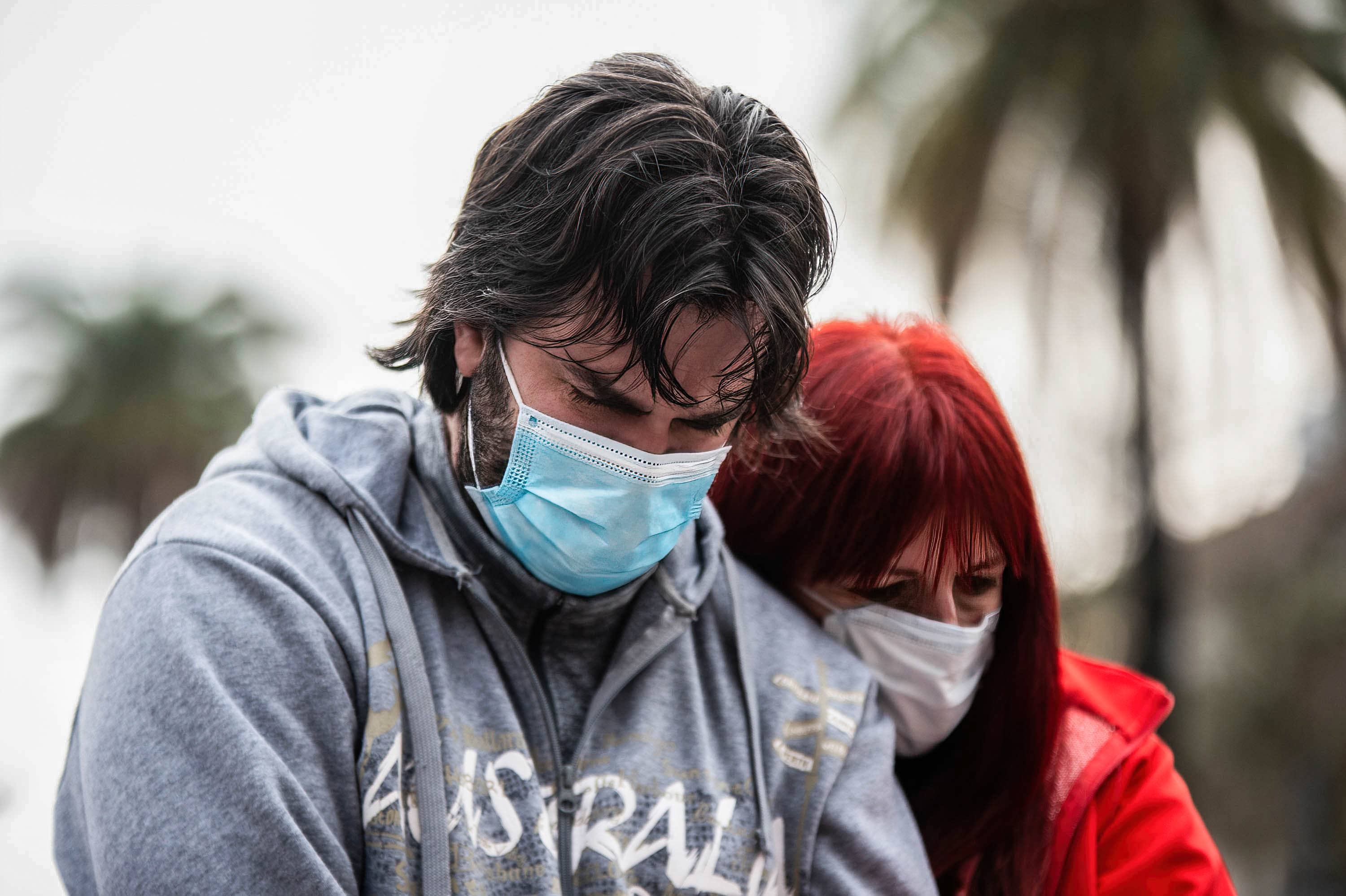Arguing with your partner over Covid? You’re not alone, with the pandemic straining many relationships

A couple wearing face masks cry for a Covid-19 victim in Argentina.
SOPA Images | LightRocket | Getty Images
The Covid-19 pandemic has taken an immense emotional toll on humankind, with people around the world dealing with the tragic loss of loved ones and heightened everyday pressures that have come from living, working and schooling from home.
While many families have enjoyed spending more time together during the pandemic, there are some relationships that have failed to thrive during a period of unprecedented upheavals and uncertainties.
From arguments over Covid rules and restrictions to disagreements over whether children should be vaccinated — and even disputes between families and friends over the very existence of the virus — have seen relationships pushed to breaking point during the pandemic, according to family law experts and psychologists.
“Marital conflicts have definitely been on the rise since the pandemic. I have noticed a rise in the number of clients seeking a divorce. I get three to four inquiries a day for my services, whereas prior to Covid the inquiries were much less,” New York City divorce lawyer Lisa Beth Older told CNBC.
She attributed the increase in divorce inquiries to couples having to work from home and spend more time together, with underlying conflicts and marital issues then harder to overlook.
However, Older, who has been practicing matrimonial law in New York for over 30 years, also noted that many of the disagreements she has seen lately have been specifically about Covid, with children a particular flashpoint.
“The most common conflict I see is where the custodial parents have different outlooks on Covid and how it affects their children,” she said.
“[For example,] anti-vaccination spouses involved in a divorce or custody dispute do not believe Covid exists, or do not agree that Covid poses a threat to the children, and so they believe that the children should be allowed to travel on airplanes, use public transportation, and go mask-less. The vaccinated spouse prefers that the child not travel or incur unnecessary public exposure to risks,” she said.
A couple with protective masks walk on a street amid a new surge of Covid-19 cases as the Omicron variant spreads on December 28, 2021, in Buenos Aires, Argentina.
Ricardo Ceppi | Getty Images News | Getty Images
One common issue that arises, Older said, is whether children should be homeschooled or attend public school, while “another argument is whether or not the children will be vaccinated or not,” although she noted that vaccine mandates for children in New York who want to do extracurricular activities had led some parents to relent over vaccine hesitancy.
“Most of the parents have bowed under the pressure and allowed their children to be vaccinated, some begrudgingly,” she said.
It’s well-known that the divorce rate has increased during the pandemic — the U.K.’s largest family law firm reported a 95% increase in divorce inquiries during the pandemic (with women driving the surge in interest). While in the U.S., Legal Templates, which sells legal forms written by licensed attorneys, reported a 34% increase in sales of its divorce agreement in the first half of 2020 (when lockdown kicked in), compared to the same time period in 2019.
The picture of divorce might be more nuanced than it first appears, however, with one study suggesting that both marriages and divorces actually fell across five U.S. states in 2020.
Wrangling over children
Children can become a particular source of conflict and anguish in a break-up. Having to continue parenting with someone once a relationship is over is often difficult, but Covid has made it harder for some parents, particularly if they have differing opinions over the virus.
Ron Kauffman, a Board-certified marital and family attorney based in Miami, told CNBC he has also seen “a sharp increase in disputes between parents arguing during the pandemic.”
The disputes often fall into three categories, Kauffman said: “Appropriate quarantine, following mask mandates, and vaccinations.” And they manifest in arguments about timesharing or visitation; i.e. the amount of time each parent spends with their child or children, he added. “When parents are separating or already separated, Covid has become a nuclear bomb to frustrate someone’s timesharing.”
Joe Klamar | AFP | Getty Images
“Covid has made timesharing especially difficult for parents who live in another state or country, who have already traveled to see their children … but are denied that opportunity after they arrive,” Kauffman added, noting that there are cases when Covid has been “weaponized to deny timesharing by a ‘gatekeeping’ parent’” that have ended up in court.
Covid denial
Like many important issues, public health measures as a result of the pandemic have split opinion. For example, some people have followed every piece of government guidance and diktat on the virus to the letter, while others have ignored rules and restrictions such as mask mandates and limits on social gathering, and have gone about their lives largely as before.
When it comes to Covid vaccines, millions have accepted the shots, which are proven to be effective, willingly, but there are still significant parts of some populations where hesitancy, skepticism and refusal are common.
And while the majority of people accept the existence of Covid — a virus that’s origins are still unknown but has to date killed over 5.5 million people and caused over 342 million infections globally — recognizing the destruction and disruption it has caused around the world, a small but active minority deny that Covid is real and believe it to be a conspiracy.
U.K.-based Consultant Clinical Psychologist Alex Desatnik told CNBC that, aside from divorces, “fractures, difficulties, conflicts — high-level conflicts — and relational stress which we’re seeing in couples is phenomenally high.”
He said the rise in breakups during the pandemic is not only due to differences in world views between couples, noting that couples or families can have differing political views and stick together. He also stressed that Covid had denied many people the social contact that would have enabled them to air their views with friends and family, and for these to be challenged.
“All of these outlets were taken away,” Desatnik said. “In the midst of a lockdown, when one person is saying it’s all a great hoax, and the other thinks it’s one of the biggest health challenges humanity has ever faced, you have to discuss it.”
Family law specialists say “Covid denial” within a family unit can be one of the hardest relationship challenges to overcome.
“I have had a client where the spouse has been a Covid denier and that obviously puts a real strain on the relationship,” Sara Barnes, a family law solicitor in the U.K. and director at EJ Coombs Solicitors, said, adding that the issue had led her client to seek advice about a possible divorce.
“I suspect that the vaccination issue for their children once they are old enough” will also be an area for conflict, she told CNBC.
Vaccine disputes
Covid vaccines are proven to reduce severe illness, hospitalization and death from the virus, but children have been far less adversely affected by Covid than adults, although they are seen as conduits for the virus. This has led to ethical questions over whether they need to be vaccinated, or boosted, as much as adults.
The World Health Organization has weighed up the clinical data and noted in November that “as children and adolescents tend to have milder disease compared to adults, unless they are in a group at higher risk of severe Covid-19, it is less urgent to vaccinate them than older people, those with chronic health conditions and health workers.” But it also stressed that there are benefits of vaccinating children and adolescents “that go beyond the direct health benefits.”
It noted that “vaccination that decreases Covid transmission in this age group may reduce transmission from children and adolescents to older adults, and may help reduce the need for mitigation measures in schools.”
With the argument for vaccinating children arguably a more complex one than for adults, it’s perhaps not surprising that the issue of Covid vaccines for children has been another area of conflict for some parents.
A woman holds a sign as various activist groups hold a rally at the Huntington Beach Pier to speak out against COVID-19 vaccine mandates for school children and workers that may be mandated by State legislature in the coming year, amid the coronavirus disease (COVID-19) pandemic, in Huntington Beach, California, U.S., January 3, 2022.
Mike Blake | Reuters
Ron Kauffman said he has seen a few cases of disputes between “anti-vax and pro-vax parents.” He insisted that conflict resolution between parents that does not involve the court system is possible and preferable.
“I have spoken to parents who have varying opinions about the severity of Covid, the usefulness of masks, and the necessity for vaccinations. These cases can work themselves out amicably,” he said.
“When parents are sincere in their medical concerns, they can be addressed by following then-existing government guidelines in the place where timesharing will take place,” he said, as well as consulting with the children’s pediatrician and immunologist for advice.
*** This article has been archived for your research. The original version can be found at CNBC ***


